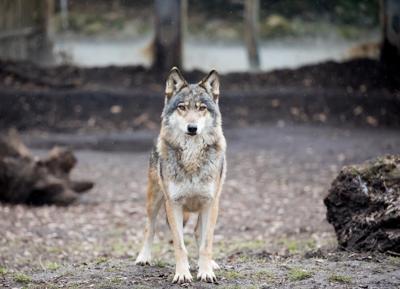As Colorado Parks and Wildlife researchers continue to study the newly confirmed presence of wolves in Colorado and their potential impact, they’ve made an unsettling find.
According to CPW biologists and veterinarians, several of the fecal samples from the pack of wolves confirmed in Moffat County contain eggs for a tapeworm called the echinococcus canadensis. This parasite is known to lead to something called hydatid disease in ungulates – hoofed mammal species – with moose and elk most susceptible.
The tapeworms that cause the disease are passed to an ungulate when the animal eats feces of a candid species that has been hosting the parasite’s eggs in their intestines. Now in a new host, the eggs hatch and move to the lungs and liver where they’ll start to form cysts filled with larvae. When these ungulates are eventually eaten by a candid species, such as a wolf, coyote, or dog, the larvae in the cyst are able to get back into the digestive track of the candid and continue its life-cycle.
Typically, these tapeworms are found in Wyoming, Montana, and Idaho – states with established grey wolf populations. However, a cyst resulting from the tapeworm was found in a Colorado moose in 2017 and the discovery in wolf scat may indicate that additional spread could be on the way.
While humans can’t get hydatid cyst disease directly from ungulates, they are able to contract the disease from canines, with domestic dogs being the most common transmitters to people. This is one reason why it is advised that pet owners consider regular deworming and also avoid letting their animals eat uncooked meat and organs from wild game – particularly ungulates.
Symptoms of the disease in carriers include diarrhea, jaundice, unexplained weight loss, anaemia, fatigue, and more. It can also cause organ failure if a cyst gets too large and a rupture may result in a fatal allergic reaction. In humans, the most common form of treatment is surgery to remove the cyst, though this can be risky as surgery can rupture the cyst and spread the parasite to more parts of the patient’s body.
As ungulates may soon face off with hydatid disease on a larger scale if the population of the wolf in Colorado grows, the ungulates also battling chronic wasting disease, an always fatal neurologic condition. While most believe the easily-transmissible chronic wasting disease is the result of a deformed prion, contradicting research as indicted that it may actually be caused by a bacteria. This has been heavily disputed in the scientific community.








(0) comments
Welcome to the discussion.
Log In
Keep it Clean. Please avoid obscene, vulgar, lewd, racist or sexually-oriented language.
PLEASE TURN OFF YOUR CAPS LOCK.
Don't Threaten. Threats of harming another person will not be tolerated.
Be Truthful. Don't knowingly lie about anyone or anything.
Be Nice. No racism, sexism or any sort of -ism that is degrading to another person.
Be Proactive. Use the 'Report' link on each comment to let us know of abusive posts.
Share with Us. We'd love to hear eyewitness accounts, the history behind an article.